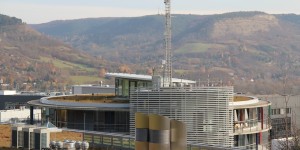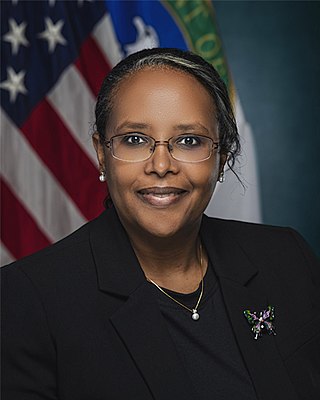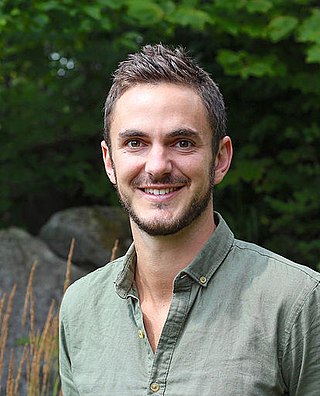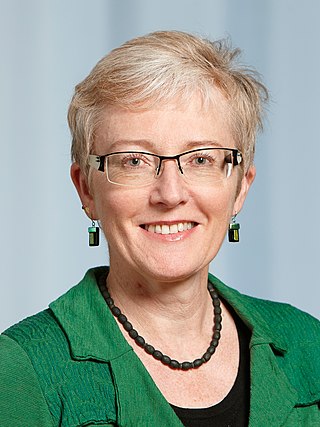
The carbon cycle is that part of the biogeochemical cycle by which carbon is exchanged among the biosphere, pedosphere, geosphere, hydrosphere, and atmosphere of Earth. Other major biogeochemical cycles include the nitrogen cycle and the water cycle. Carbon is the main component of biological compounds as well as a major component of many minerals such as limestone. The carbon cycle comprises a sequence of events that are key to making Earth capable of sustaining life. It describes the movement of carbon as it is recycled and reused throughout the biosphere, as well as long-term processes of carbon sequestration (storage) to and release from carbon sinks.

Biogeochemistry is the scientific discipline that involves the study of the chemical, physical, geological, and biological processes and reactions that govern the composition of the natural environment. In particular, biogeochemistry is the study of biogeochemical cycles, the cycles of chemical elements such as carbon and nitrogen, and their interactions with and incorporation into living things transported through earth scale biological systems in space and time. The field focuses on chemical cycles which are either driven by or influence biological activity. Particular emphasis is placed on the study of carbon, nitrogen, sulfur, iron, and phosphorus cycles. Biogeochemistry is a systems science closely related to systems ecology.

The Max Planck Institute for Biogeochemistry is located in Jena, Germany. It was created in 1997, and moved into new buildings 2002. It is one of 80 institutes in the Max Planck Society.
William H. Schlesinger is a biogeochemist and the retired president of the Cary Institute of Ecosystem Studies, an independent not-for-profit environmental research organization in Millbrook, New York. He assumed that position after 27 years on the faculty of Duke University, where he served as the Dean of the Nicholas School of the Environment and Earth Sciences and James B. Duke Professor of Biogeochemistry.
Donald Bruce Dingwell is a Canadian geoscientist who is the director of the Department of Earth and Environmental Sciences and Ordinarius for Mineralogy and Petrology of the Ludwig Maximilian University of Munich. He is also currently vice-president of the Academia Europaea. From September 2011 to December 2013 he was the third and last secretary general of the European Research Council (ERC) where he embarked on a global participation campaign for the ERC. He is also a past-President of the European Geosciences Union and the current past-president of the International Association of Volcanology and Chemistry of the Earth's Interior (IAVCEI), founded in 1919.
Ronald Amundson is an American environmental scientist who is currently Professor at University of California, Berkeley.

Asmeret Asefaw Berhe is a soil biogeochemist and political ecologist who is the current Director of the Office of Science at the US Department of Energy. She was previously the Professor of Soil Biogeochemistry and the Ted and Jan Falasco Chair in Earth Sciences and Geology in the Department of Life and Environmental Sciences; University of California, Merced. Her research group worked to understand how soil helps regulate the earth's climate.

Thomas Ward Crowther is a professor of ecology at ETH Zürich and co-chair of the advisory board for the United Nations Decade on Ecosystem Restoration. At ETH Zürich, he started Crowther Lab, an interdisciplinary group of scientists exploring the role of biodiversity in regulating the Earth's climate. Crowther is the founder of Restor, an online platform that provides ecological data, connectivity, and transparency to conservation and restoration projects around the world. In 2021, the World Economic Forum named Crowther a Young Global Leader.
Whendee Silver is an American ecosystem ecologist and biogeochemist.

Erika Marín-Spiotta is a biogeochemist and ecosystem ecologist. She is currently Professor of Geography at the University of Wisconsin-Madison. She is best-known for her research of the terrestrial carbon cycle and is an advocate for underrepresented groups in the sciences, specifically women.
Adina Paytan is a research professor at the Institute of Marine Sciences at the University of California, Santa Cruz. known for research into biogeochemical cycling in the present and the past. She has over 270 scientific publications in journals such as Science, Nature, Proceedings of the National Academy of Sciences, and Geophysical Research Letters.

Thomas S. Bianchi is an oceanographer and biogeochemist. He is currently the Jon and Beverly Thompson Endowed Chair of Geological Sciences at the University of Florida and Editor-in-chief of the journal Marine Chemistry.
Clare Reimers is a Distinguished Professor of Ocean Ecology and Biogeochemistry at Oregon State University's College of Earth, Ocean and Atmospheric Sciences.
Kate Lajtha is an ecologist known for her use of stable isotopes to examine biogeochemical cycling in soils.
Margaret Torn is an ecologist at Lawrence Berkeley National Laboratory known for her research on carbon cycling, especially with respect to the interactions between soils and the atmosphere.
Jennifer Harden is geologist known for her research on soils, particularly tracking changes in soil profiles over time and the role of soil systems in carbon and nitrogen cycling.

Nina Buchmann is a German ecologist known for her research on the physiology of plants and the impact of plants on biogeochemical cycling. She is a member of the German National Academy of Sciences Leopoldina and an elected fellow of the American Geophysical Union.
Merritt Turetsky is an American ecosystem ecologist and a professor at the University of Colorado Boulder. She currently serves as the Director of Arctic Security for the University of Colorado. She served as the first woman Director of the Institute for Arctic and Alpine Research (INSTAAR) from 2019-2023. Her research considers fire regimes, climate change and biogeochemical cycling in Arctic wetlands. Turetsky is a member of the Permafrost Action Team (SEARCH), a group of scientists who translate and deliver science to decision-makers.
Mariah Suzanne Carbone is an American geophysicist who is a professor of Geosciences at the Center for ecosystem science and society, Northern Arizona University. She studies terrestrial ecosystems and how they respond to environmental change.
Elisabeth Lynn Sikes is an American geoscientist who is a professor at Rutgers University. Her research considers carbon cycling. She was awarded the 2022 Scientific Committee on Antarctic Research Medal for Excellence in Research.








